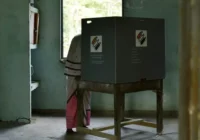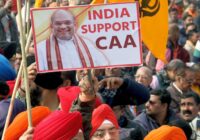India’s responsibility to the LGBTQ community doesn’t just end at decriminalizing homosexuality.
On the night of February 8, 2010, Shrinivas Ramachandra Siras was caught red-handed with his alleged lover, a rickshaw puller. A professor at one of India’s premier schools, the Aligarh Muslim University, Siras became a sensation overnight, for all the wrong reasons. He was suspended, forced to leave his staff quarters and boycotted socially for his sexual choices. Two months later, he committed suicide. At the time, no one questioned the violation of Professor Siras’s privacy and his right to sexual freedom, despite the decriminalization of homosexuality a year before in a historic judgement by the Delhi High Court.
In 2013, the situation became worse for people of the LGBTQ community, who now became legal offenders when the Supreme Court of India overturned the judgement, upholding the archaic Section 377 of the Indian Penal Code. Section 377, a remnant of India’s colonial past, criminalizes sexual activities between humans of the same sex, including anal and oral sex, as “against the order of nature.” The law, which became a part of Indian Penal Code during the British Raj in the 1860s, was surprisingly upheld for many years despite the former colonial power getting rid of the same legislation in 1967.
The last five years have seen many protests, anger and resentment following the criminalization of homosexual activities. Like Ramachandra Siras, the private lives of many homosexual people came under scrutiny. It was not uncommon to hear stories about gay people being rounded up in public or blackmailed with a jail term. Transgenders, who have access to education and health care, suddenly saw themselves facing a jail term if they chose to maintain sexual relations in private.
In some instances, those who faced charges under Section 377 were denied promotions or directorships in firms. All this in a country that has a history of homosexual relationships and once lauded transgenders for their service to the society.
On September 6, 2018, India finally took a step toward full decolonization of its penal code by striking down Section 377 and ushering in a new era for liberalism in a country which has recently seen a wave of right-wing Hindu nationalism. A five-judge bench, which included the chief justice of India, Dipak Misra, called the act “archaic” and upheld personal freedom in a 493-page judgment.
Addressing concerns related to gender identity and conformity, the bench showed sensitivity to gender issues, gender fluidity and the right to choice and autonomy exercised by an individual. It upheld consensual intercourse between individuals and struck down arguments claiming that carnal sex between two people of the same gender was against nature. A particular observation of the bench that “majoritarian views and popular morality cannot dictate constitutional rights. We have to vanquish prejudice, embrace inclusion and ensure equal rights” is particularly noteworthy.
According to advocate Arundhati Katju, who represented the petitioners in the case against Section 377, the verdict now pronounces people of the LGBTQ community as citizens with equal rights under the eye of the law. But while India’s high court seems ready to overlook popular morality, is the majority willing to embrace inclusivity?
Just striking down an archaic law doesn’t mean that India has progressed. There’s still a long way to go. The LGBTQ community is yet to receive the right to marriage and adoption, and yet to be integrated into the larger framework of society. While privileged LGBTQ members have come out with pictures of their partners, those belonging to the lower strata of society still fear social ostracization. Indian workplaces, schools and colleges are yet to encourage discussions on sexuality and sensitize workers against any form of discrimination against people of this community.
Depression, anxiety and AIDS are still rampant health issues in the LGBTQ community, and there is lack of clarity on health-care availability without discrimination. The police, too, needs to be sensitized and protect the rights of the minority instead of subjecting them to ridicule and, in certain cases, violence when they report crimes such as rape. Political parties need to educate their workers — certain representatives of a right-wing party still believe that same-sex relations are not “compatible with the laws of nature.” Above everything, there can’t be another repeat of what happened to Professor Siras. There needs to be a strict implementation of the law, and eagerness from the bureaucracy to uphold the rights of every citizen of India.
In a world that is largely democratic in nature, people are free to choose the gender they identify with and the gender they may or may not be attracted to. Unfortunately, Indian culture is still largely heteronormative in nature, with movies portraying the ideal romance between only a man and a woman. Homosexuals are ridiculed on screen, and this proliferates into society, where a man who is less masculine in nature is mocked as gay or chakka (transgender), or a woman who is tomboyish in nature is seen as an aberration from the traditional Indian naari (woman).
India’s stand on LGBTQ rights is important, given its strategic position in a subcontinent where homosexuality or same-sex relations is a criminal offence in most countries and even punishable by death in some. The world’s largest democracy owes an apology to the LGBTQ community for its historical marginalization, but also needs to understand its responsibility in a world where free speech and privacy are under threat every single day.
*[An earlier version of this article erroneously stated that Section 377 was incorporated into the British India’s Constitution rather than the Penal Code of India.]
The views expressed in this article are the author’s own and do not necessarily reflect Fair Observer’s editorial policy.
Support Fair Observer
We rely on your support for our independence, diversity and quality.
For more than 10 years, Fair Observer has been free, fair and independent. No billionaire owns us, no advertisers control us. We are a reader-supported nonprofit. Unlike many other publications, we keep our content free for readers regardless of where they live or whether they can afford to pay. We have no paywalls and no ads.
In the post-truth era of fake news, echo chambers and filter bubbles, we publish a plurality of perspectives from around the world. Anyone can publish with us, but everyone goes through a rigorous editorial process. So, you get fact-checked, well-reasoned content instead of noise.
We publish 2,500+ voices from 90+ countries. We also conduct education and training programs
on subjects ranging from digital media and journalism to writing and critical thinking. This
doesn’t come cheap. Servers, editors, trainers and web developers cost
money.
Please consider supporting us on a regular basis as a recurring donor or a
sustaining member.
Will you support FO’s journalism?
We rely on your support for our independence, diversity and quality.






